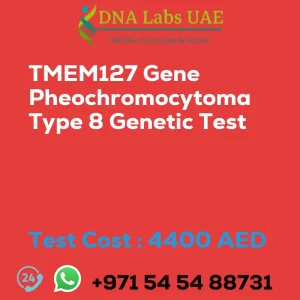CDKN2A Gene Pancreatic cancer/melanoma syndrome familial Genetic Test
Genetic testing for the CDKN2A gene can help identify mutations or alterations in the gene that may increase the risk of developing pancreatic cancer and melanoma. This test is particularly useful for individuals with a family history of these cancers.
Test Details
The CDKN2A gene is associated with a condition called pancreatic cancer/melanoma syndrome, familial. This syndrome is characterized by an increased risk of developing both pancreatic cancer and melanoma, a type of skin cancer.
NGS (Next-Generation Sequencing) genetic testing is used to analyze multiple genes simultaneously. In the case of CDKN2A gene testing, NGS can identify any mutations or alterations in the gene that may increase the risk of developing pancreatic cancer and melanoma.
Components
- Test Name: CDKN2A Gene Pancreatic cancer/melanoma syndrome familial Genetic Test
- Price: 4400.0 AED
- Sample Condition: Blood or Extracted DNA or One drop Blood on FTA Card
- Report Delivery: 3 to 4 Weeks
- Method: NGS Technology
- Test Type: Cancer
- Doctor: Oncologist
- Test Department: Genetics
Pre Test Information
Before undergoing the CDKN2A gene test, it is important to provide the clinical history of the patient who is going for the test. Additionally, a genetic counseling session may be conducted to draw a pedigree chart of family members affected with CDKN2A Gene Pancreatic cancer/melanoma syndrome, familial NGS Genetic DNA Test.
Genetic Counseling
If you are considering CDKN2A gene testing, it is recommended to consult with a genetic counselor or healthcare professional who specializes in genetics. They can assess your personal and family history, discuss the benefits and limitations of genetic testing, and provide guidance on the next steps.
Genetic testing can provide information about an individual’s genetic predisposition and help guide medical management and screening recommendations. However, it is important to note that genetic testing is not definitive and cannot guarantee the development or absence of cancer.
Make informed healthcare decisions by consulting with a genetic counselor or healthcare professional specialized in genetics.
| Test Name | CDKN2A Gene Pancreatic cancermelanoma syndrome familial Genetic Test |
|---|---|
| Components | |
| Price | 4400.0 AED |
| Sample Condition | Blood or Extracted DNA or One drop Blood on FTA Card |
| Report Delivery | 3 to 4 Weeks |
| Method | NGS Technology |
| Test type | Cancer |
| Doctor | Oncologist |
| Test Department: | Genetics |
| Pre Test Information | Clinical History of Patient who is going for CDKN2A Gene Pancreatic cancer/melanoma syndrome, familial NGS Genetic DNA Test. A Genetic Counselling session to draw a pedigree chart of family members affected with CDKN2A Gene Pancreatic cancer/melanoma syndrome, familial NGS Genetic DNA Test gene CDKN2A |
| Test Details |
The CDKN2A gene is associated with a condition called pancreatic cancer/melanoma syndrome, familial. This syndrome is characterized by an increased risk of developing both pancreatic cancer and melanoma, a type of skin cancer. NGS (Next-Generation Sequencing) genetic testing is a method used to analyze multiple genes simultaneously. In the case of CDKN2A gene testing, NGS can be used to identify any mutations or alterations in the gene that may increase the risk of developing pancreatic cancer and melanoma. Genetic testing for CDKN2A gene mutations can be helpful for individuals with a family history of pancreatic cancer and melanoma. It can provide information about their personal risk of developing these cancers and help guide medical management and screening recommendations. It is important to note that genetic testing is not definitive and cannot guarantee the development or absence of cancer. It provides information about an individual’s genetic predisposition and can help inform healthcare decisions. If you are considering CDKN2A gene testing, it is recommended to consult with a genetic counselor or healthcare professional who specializes in genetics. They can help assess your personal and family history, discuss the benefits and limitations of genetic testing, and provide guidance on the next steps. |








